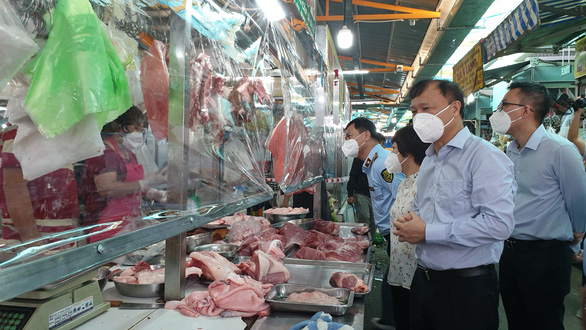
HCM CITY — Supply of consumer goods in HCM City has been relatively steady, but the prices of some items have shot up and businesses taking part in the city’s price stabilisation programme are suffering big losses since they sell at fixed prices, according to the Department of Industry and Trade.
Speaking at a meeting with a special working group from the Ministry of Industry and Trade on Wednesday, a department official said though the amount of goods transported to the city is steady, the prices of some items are high. For instance, there is a short supply of eggs due to various reasons, and demand is high, he said.
Businesses that have signed up for the price stabilisation programme have to buy poultry eggs at VNĐ31,000 for a tray of 10, but sell them at VNĐ29,000, their registered price, he said. They need to get approval from relevant departments to raise retail prices.
He said the Ministries of Industry and Trade and Agriculture and Rural Development should help them buy at steady prices.
Phạm Thị Huân, chairwoman of Ba Huân Joint Stock Company, said her company sells a million eggs in the city each day, half of them bought from other farms.
Egg prices have risen sharply after animal feed prices went up by 20-30 per cent since the beginning of the year and transport costs surged due to COVID-19.
But though farms have hiked their price to VNĐ30,000 - 31,000 for a tray of eggs, her company has to buy them, according to Huân.
The company has stopped supplying eggs to bakeries and delivering to other provinces to focus on the city market.
Businesses in the price stabilisation programme have urged the city to adjust the prices of poultry eggs to reasonable levels, but with demand skyrocketing, it has refused to do so.
After inspecting traditional markets, Deputy Minister of Industry and Trade Đỗ Thắng Hải said the city should consider reopening them and its three wholesale markets soon.
Normally, the wholesale and traditional markets meet 70 per cent of the city’s food and grocery demand, with the other 30 per cent provided by modern retail systems such as supermarkets.
The closure of the markets put pressure on the latter, affecting not only the city but also neighbouring localities, Hải said.
According to the city Department of Industry and Trade, as of July 21 only 32 traditional markets remained open and 205 other were closed as part of efforts to contain COVID-19.
Bùi Tá Hoàng Vũ, its director, said districts were actively developing plans to reopen traditional markets with protocols in place to ensure the safety of both sellers and buyers.
"But with the unpredictable situation in many districts, the reopening needs to be done carefully.” — VNS